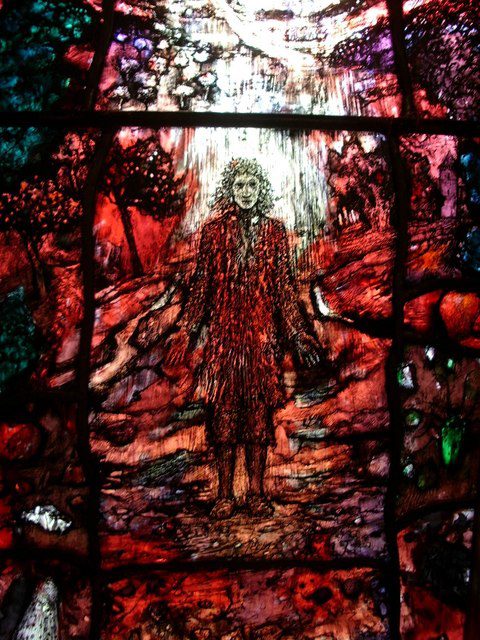I write about all kinds of things, but by vocation I am a retired English professor whose academic specialty is 17th century Christian poetry. So Paul Butler of the “World and Everything in It” podcast with World Radio wanted to do a feature on Thomas Traherne, this being the 350th anniversary of his death. My former student Chelsea Boes, now editor of World Kids, put him onto me, so Paul interviewed me on the topic of Traherne and the value of Christian poetry. (Here is the podcast and a transcript.)
Traherne is probably the least known of the so-called Metaphysical poets, and no wonder. He was an Anglican parson of a village church and then served as the private chaplain to a nobleman, but he was little known during his lifetime. His writings–his poetry and some meditations–weren’t even discovered until 1898, and they weren’t published until 1903.
The early 20th century was when the metaphysical poets were first being seriously studied and Traherne was lumped among them, though he would seem to be quite different from the others. Unlike George Herbert and John Donne, Traherne’s verse is easy reading, not particularly complex or multi-leveled. His main similarity with the others is that he, like them, each in his own way, is so fresh and innovative.
Traherne is the great poet of joy. Or, to use his term, “felicity.” We should awaken to the joy that is ours as Christians, knowing that everything we perceive around us, no matter how ordinary, is a wondrous creation of God who loves us and who has redeemed us through Christ.
Traherne is great to read when you are feeling down. His joy in simple existence is infectious. Here is my favorite. Most of his poems rhyme in the conventional way, but this one is in free verse, a form that he is inventing centuries before modern poets got their hands on it.
I love this poem for its lugubrious-sounding title, which is in contrast to the exuberance and excited happiness of the actual poem. It consists mainly of just a list of common things that God has created, moving to a contemplation of our senses and our minds that can perceive such amazing gifts. And then come the final two lines, with their staggering turn:
A Serious and Pathetical Contemplation of the Mercies of God
For all the mysteries, engines, instruments, wherewith the world is filled, which we are able to frame and use to thy glory.
For all the trades, variety of operations, cities, temples, streets, bridges, mariner’s compass, admirable picture, sculpture, writing, printing, songs and music; wherewith the world is beautified and adorned.
1 Much more for the regent life,
2 And power of perception,
3 Which rules within.
4 That secret depth of fathomless consideration
5 That receives the information
6 Of all our senses,
7 That makes our centre equal to the heavens,
8 And comprehendeth in itself the magnitude of the world;
9 The involv’d mysteries
10 Of our common sense;
11 The inaccessible secret
12 Of perceptive fancy;
13 The repository and treasury
14 Of things that are past;
15 The presentation of things to come;
16 Thy name be glorified
17 For evermore.
….
18 O miracle
19 Of divine goodness!
20 O fire! O flame of zeal, and love, and joy!
21 Ev’n for our earthly bodies, hast thou created all things.
22 { visible
23 All things { material
24 { sensible
25 Animals,
26 Vegetables,
27 Minerals,
28 Bodies celestial,
29 Bodies terrestrial,
30 The four elements,
31 Volatile spirits,
32 Trees, herbs, and flowers,
33 The influences of heaven,
34 Clouds, vapors, wind,
35 Dew, rain, hail and snow,
36 Light and darkness, night and day,
37 The seasons of the year.
38Springs, rivers, fountains, oceans,
39 Gold, silver, and precious stones.
40 Corn, wine, and oil,
41 The sun, moon, and stars,
42 Cities, nations, kingdoms.
43And the bodies of men, the greatest treasures of all,
44 For each other.
45What then, O Lord, hast thou intended for our
46Souls, who givest to our bodies such glorious things!
Let that sink in. God is so generous to our bodies, what does He have in store for our souls? If this physical existence is so glorious, how much more glorious is Heaven going to be!
Illustration: Detail of the Thomas Traherne stained glass windows in the Cathedral at Hereford, where he was born. The windows were made by Tomm Denny and installed in 2007. Photo by pam fray, CC BY-SA 2.0, https://commons.wikimedia.org/w/index.php?curid=13158581*
*There seem to be no authentic portraits of Thomas Traherne. The ones online, including an animation of a 17th century gentleman with big hair reading his poetry, are either misattributed or are modern renditions. This one is a modern stained glass window in Traherne’s honor in the cathedral of the city in which he was born, the son of a shoemaker. It presents him as a visionary transfigured by the light of God in him and in the world. It is an interpretation of the meaning of his work rather than a physical likeness.














